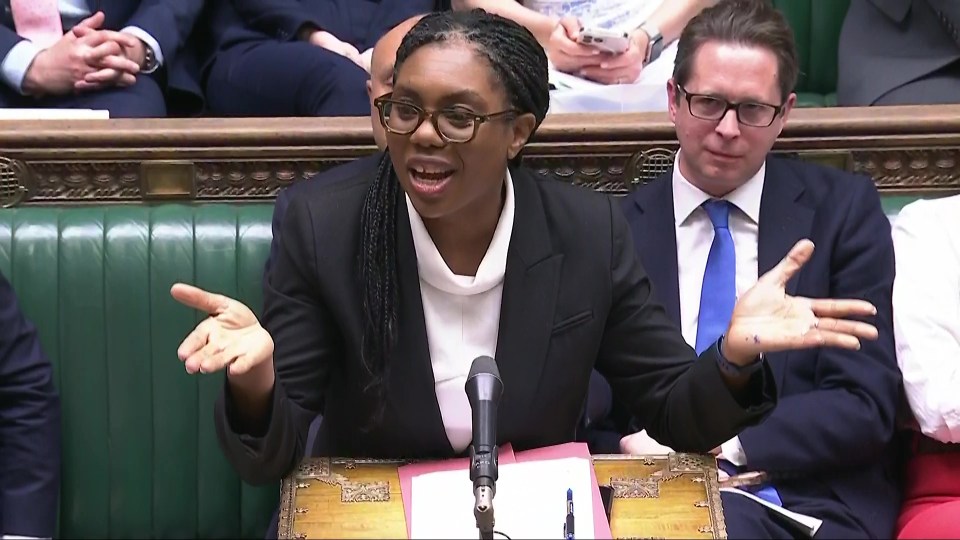MPs have approved emergency plans to save British Steel’s Scunthorpe blast furnaces.
Both the Commons and the Lords broke from Easter recess for a highly unusual Saturday sitting to debate the Steel Industry (Special Measures) Bill.
The legislation is aimed at blocking the company’s Chinese owners, Jingye, from closing blast furnaces at its Scunthorpe plant.
The plans will see taxpayer money used to provide materials to the steelworks and open the door to a transfer of ownership.
It will now be debated by the Lords as the Government attempts to get the powers on the statute book in a single day.
Sir Keir Starmer warned the future of the firm “hangs in the balance”.
Ministers hope to secure a private partner to open up co-investment options for a transition.
But urgent temporary action was seen as necessary to keep the plant running until longer-term plans are agreed.
The Commons sitting started at 11am and the House of Lords from midday in the first parliamentary recall on a Saturday since 1982, when MPs returned after the start of the Falklands War.
Jonathan Reynolds told MPs that developments over recent days had made Saturday’s extraordinary sitting of Parliament necessary.
He said Jingye rejected the Government’s offer of support and took steps to end steel production at Scunthorpe.
“Doing nothing is not an option,” the Business Secretary continued.
“We could not, will not and never will stand idly by while heat seeps from the UK’s remaining blast furnaces without any planning, any due process or any respect for the consequences.
“And that is why I needed colleagues here today.”
But the Conservatives said the Government should have acted sooner.
Alex Burghart accusing ministers of making “a total pig’s breakfast of this whole arrangement” as they sought “far-reaching powers not seen in legislation really in the past 40 years”.
Opening his speech presenting the Bill, Mr Reynolds said the Government had made a “substantial” offer of support to Jingye.
That offer would have seen the Government buy the raw materials needed to keep making steel “that would have ensured no losses whatsoever for Jingye” in maintaining the furnaces.
But that offer was rejected, with Jingye making a counter offer that involved the Government paying the company “hundreds of millions of pounds”.
He said there were no conditions to stop the money being transferred to China and no agreement to keep the blast furnaces “maintained and in good working order”.
Mr Reynolds said: “Despite our offer to Jingye being substantial, they wanted much more.
“Frankly, an excessive amount. We did however remain committed to negotiation.
“But over the last few days, it became clear that the intention of Jingye was to refuse to purchase sufficient raw material to keep the blast furnaces running, in fact, their intention was to cancel and refuse to pay for existing orders.
“The company would therefore have irrevocably and unilaterally closed down primary steel making at British Steel.”
Mr Reynolds said the emergency legislation was a “proportionate and necessary step”.
What happens next?
The Steel Industry (Special Measures) Bill is now moving to the other House after passing its third reading.
All bills must pass through both Houses of Parliament.
If one House approves a bill, and it passes to the next House for approval but amendments are made, it will need to pass back to the original House – with the amendments made – to be voted on again.
Any changes (amendments) made have to be agreed by both Houses.
The King – in his role as head of state – gives royal assent to the bill.
This is the final stage of the bill’s progress in Parliament and is essentially the monarch’s official approval.
He added he wanted it to be a “temporary position” with the powers not lasting “any minute longer than is necessary”.
Saturday’s emergency legislation stops short of full nationalisation of British Steel.
Ministers remain hopeful that they can secure private investment to save the plant.
But speaking to the BBC, industry minister Sarah Jones conceded there were currently no companies willing to make an offer.
While in the Commons Mr Reynolds acknowledged that public ownership was “the likely option”.
Ms Jones also insisted there would be “no extra cost to the Exchequer” as a result of the Government’s actions.
Costs would be met from a £2.5billion steel fund announced at last year’s budget.
Prior to Saturday’s debate, Tory leader Kemi Badenoch accused the Government of having “bungled” a deal she had negotiated with Jingye to “modernise” British Steel’s operations.
She added in the Commons that Labour “cannot negotiate”.
Mr Reynolds denied that Labour had inherited a deal and he had been told on taking office “that there had been a lack of progress on this matter”.
Recalling Parliament shows how serious steel crisis is
By JACK ELSOM, Chief Political Correspondent
EVERY time a minor emergency emerges during MPs’ holidays, the usual suspects are quick to demand Parliament is recalled.
That their siren calls are almost always ignored speaks to just how serious a crisis must be to warrant such action.
Tomorrow will be one of those occasions: a recall that is so rare it has only happened 34 times since the Second World War.
While Parliament is the lifeblood of our democracy, the truth is that most action in a crisis can be taken without the need to involve MPs.
Sir Keir Starmer, his ministers and his officials wield enough executive power to handle events without needing a Commons sign-off.
But there are times when MPs are needed to ram through urgent laws, such as will happen tomorrow when the government seeks control of steelmaking in Britain.
Other times are of such national or international significance that anything less than a recall would not suffice.
The Taliban’s capture of the Afghan government in 2021 was such a time, giving MPs a chance to make their points despite playing no actual role in the response.
Tomorrow’s recall will mean MPs returning from their constituencies all across the land.
For any who have already escaped the country for some Easter sun, a long trip back awaits…
He challenged Ms Badenoch to explain how much her deal would have cost the taxpayer.
She replied: “We had not finished the negotiation so there was no amount, but it would have succeeded better than the terrible plan he’s got now.”
Meanwhile, the Government has been criticised for acting to save the Scunthorpe plant but not taking the same action when the Tata Steel works in Port Talbot were threatened with closure.
Plaid Cymru’s Westminster leader Liz Saville Roberts said her party would seek to amend the Bill to extend its powers to Wales.
Liberal Democrat Wales spokesman David Chadwick said workers in South Wales “will be asking themselves how this unjust situation was ever allowed to occur”.
Earlier, Ms Jones said the different approach was due to Tata’s willingness to invest in Port Talbot, and the changed global circumstances making it necessary to protect the UK’s primary steel making capacity.
In a letter to MPs, Commons Speaker Sir Lindsay Hoyle said he was satisfied the “public interest” requires the recall to debate the Steel Industry (Special Measures) Bill.
Jingye, which bought British Steel in 2020, has said it invested more than £1.2billion to maintain operations amid ongoing production instability and “significant” financial losses of around £700,000 a day.
The Government says the new law would allow it to order raw materials for Scunthorpe’s blast furnaces amid fears supplies are on the brink of running out.
Ministers would be able to direct the company’s board and workforce, and ensure anyone at the plant “who takes steps to keep it running, against the orders of the Chinese ownership” can be reinstated if they are sacked.
The proposals to close Scunthorpe’s furnaces had sparked fears of job losses at the plant, which employs thousands of people.
Mr Reynolds said Jingye had confirmed the plans despite months of talks and a £500million co-investment offer from Government.
He said this left ministers “no choice” but to act to spare job losses and save the plant.


















